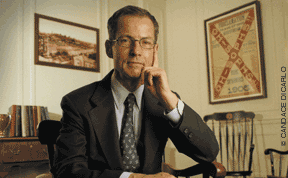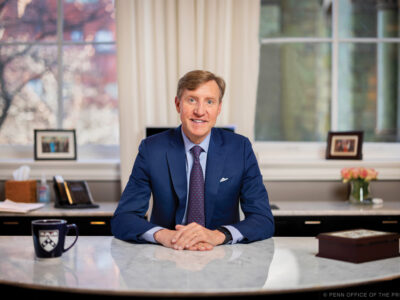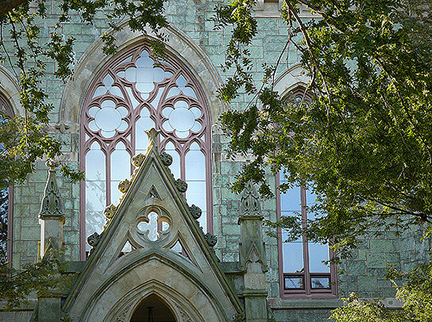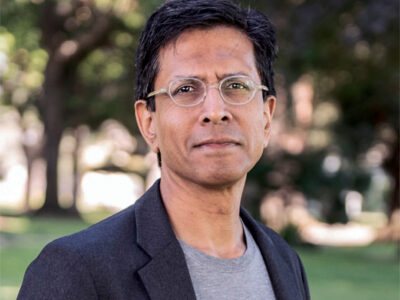
Paul Williams W’67 remembers his junior and senior years at Penn as “two of the best years of my life.” Not only was he immersed in great classes at Wharton and the College; he also was active in campus groups like the Community Involvement Council and the Student Committee on Undergraduate Education.
But when Williams, now managing director of Nuveen Investments in Chicago, graduated, it didn’t occur to him to stay involved with his alma mater. “In the years immediately after school, I thought about work,” he says. Today, as the new president of the University’s alumni society, Williams wants to help alumni connect with Penn at all stages of their lives. “One of the most important things [we] can do is to nurture and build a sense of community, and to provide meaningful services and opportunities in which alumni can take advantage of the University as a source of continuing education, friendship, or networking.” He notes that “the needs of a person coming right out of school are quite different from what they are 10 to 15 years [later],” and the way one relates to his or her alma mater changes, too.
Williams says he wants to continue the efforts of recent predecessors, Leonard Shapiro W’64 and Elsie Sterling Howard CW’68, to build alumni leadership and encourage volunteer involvement on a wider scale, and to build upon some of the “fabulous initiatives” that recognize Penn’s increasingly diverse alumni body. He also lauds the “tremendous job” done by the Alumni Relations staff in programming and communications. “They’ve already accomplished a hell of a lot, and I just want to push that forward.”
Williams cites the need to use technology to simplify communication with and between alumni clubs, special-interest groups, and alumni leaders. Another key goal is to spread the word to all those alumni who may not even be aware of the services and opportunities they are entitled to as Penn graduates. As part of a “brand awareness” campaign to clarify and communicate the identity of the University’s alumni organization, plans call for renaming it from the rather formal University of Pennsylvania Alumni Society to, simply, Penn Alumni.
The point is to make people aware that everyone who graduates from Penn is part of the alumni body, Williams says. “The acronym UPAS always caused a lot of question marks in people’s minds. Hopefully [this change] will bring Penn more forward in the minds of alumni worldwide.”
Returning to the notion of crafting different ways for alumni to connect with Penn at different stages in their lives, Williams offers as an example the idea of setting up a mentoring program to help guide alumni in their career choices, be it searching for a first job or pursuing an advanced degree. “Recent graduates really need to find their way in the work force and now have a much more challenging environment than [graduates] had a couple of years ago for finding first jobs.”
Though it wasn’t until the late 1980s that Williams became active in alumni leadership, he more than made up for lost time, helping to sponsor projects for the biology, mathematics, and physics departments; the College House renewal project; and the Celebration of 125 Years of Women at Penn. He has served on the Board of Overseers of the School of Arts and Sciences since 1994, and as an Alumni Trustee for the Central Region since 2000. He also played an instrumental role in forming the Midwest Regional Advisory Board in Chicago. Over the years he has established several term chairs and endowed scholarships in the School of Arts and Sciences, as well as a program to expand research opportunities for undergraduate biology students. More recently, he initiated a challenge grant for the “250 in 5” fundraising campaign for the W.E.B. DuBois Scholarship.
Dr. Samuel Preston, dean of the School of Arts and Sciences, says, “Paul has been a spirited and tireless supporter of the School through his service as Overseer. We have to be careful not to ask for help too often because he invariably gives whatever we ask for. Perhaps his greatest sacrifice was uncomplainingly taking me to a cold, wet early April game at my favorite place in the world, Wrigley Field.”
Robert Alig C’84 WG’87, assistant vice president of alumni relations, describes Williams as an alumni leader with “indomitable energy,” citing how “he literally spent 14 hours with me” on the Saturday of Alumni Weekend, making connections with people from the Class of 1938, celebrating their 65th reunion, to the fifth-reunion year Class of 1998.
In his early meetings with Williams, Alig says he was impressed by “the thoughtful, deliberate assessments he went through in getting to know me and the Office of Alumni Relations to really determine whether there was a good fit between what we were trying to do and his vision for the office and what his strengths were. I think the fundamental core for both of us is that people reconnect with Penn for a variety of reasons, and our challenge is to help facilitate that connection.”
—Susan Frith




